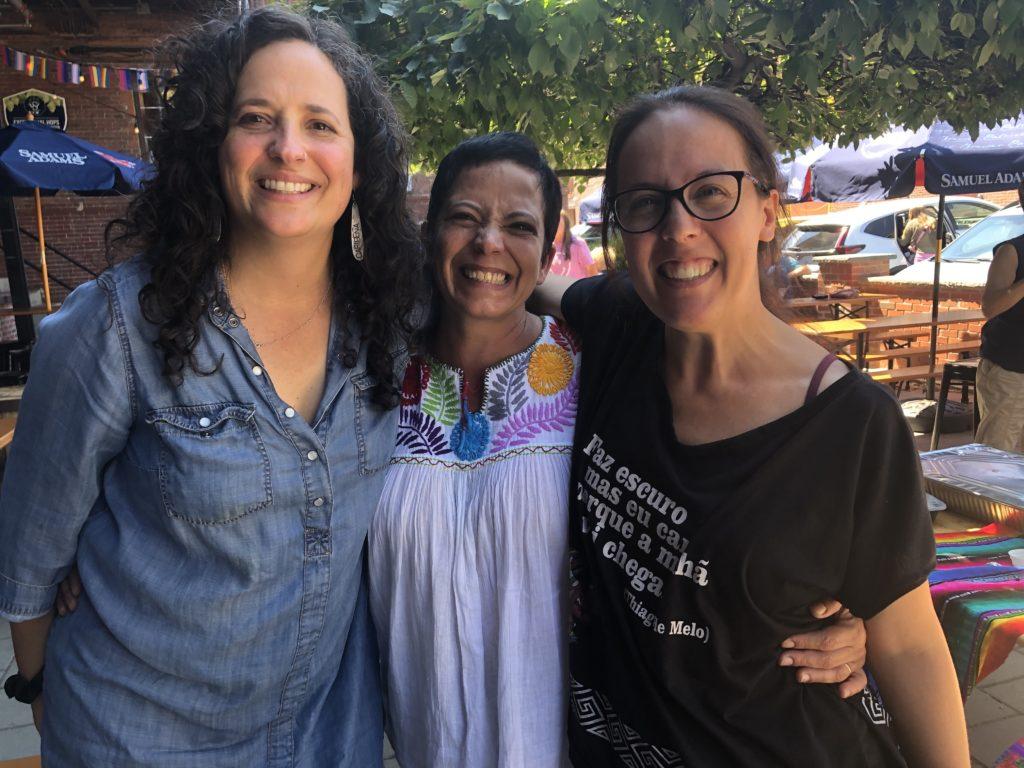Rural Movements Defend Brazil’s Democracy
Landless Workers Movement (MST) members march against Brazilian President Jair Bolsonaro on June 19, 2021. Photo from the MST.
As Brazil looks ahead to the elections this weekend, our partner Movimento dos Trabalhadores Rurais Sem Terra (Landless Workers Movement, MST) knows the stakes.
This August, Cássia Bechara from the MST’s international relations collective visited our offices in Jamaica Plain. She discussed the vibrant work of organizers and activists building in rural communities across Brazil — and the complex threat they face from the right-wing.
“[Current president Jair] Bolsonaro is losing and losing support, and he’s kind of desperate,” Cássia told us, looking ahead to Brazil’s national elections on October 2nd. “He still has about 25 percent as a faithful social base. His strategy is to enrage this 25 percent.”
Enraging that base has had serious consequences for Brazil’s rural peoples like those in the MST. As the Pastoral Land Commission (CPT) reported, 2021 saw a 30 percent increase in murders of landless people versus 2020.
But the far right’s threat to Brazil’s popular democracy goes beyond direct violence from state, corporations, and vigilante forces. They have other, subtler ways of attack.
UNDERMINING BRAZIL’S CONSTITUTION
Every action of the MST and MTST (Homeless Workers Movement) should be typified as terrorism. Private property is sacred.” — Jair Bolsonaro
“It’s in our constitution that every piece of land must fulfill a social function. It doesn’t matter if it’s privately owned or not… We are not saying anything different from what our constitution says.” — Cássia Bechara
Despite Bolsonaro’s rhetoric, the MST grounds its work in Brazil’s constitution.
“It’s in our constitution that every piece of land must fulfill a social function. It doesn’t matter if it’s privately owned or not,” Cássia told us. “If any of those functions are not fulfilled, that land should be taken for agrarian reform. We are not saying anything different from what our constitution says.”
The far right’s discourse about private property serves a purpose. Not only does it attempt to isolate the MST and justify the movement’s violent repression. It seeks to undermine the most progressive aspects of Brazil’s constitution and enshrine the mega concentration of land in just a few hands.
Roughly one percent of landowners control almost 50 percent of the land in rural Brazil. While the MST has made gains in recent decades to take back land for poor and working people, the big landowners use physical force — and the related ideological force — to maintain their control of tens of millions of hectares.
This structural violence, deeply ingrained in the social fabric of Brazil, is precisely what Bolsonaro tapped into and bolstered, argued Cassia.
FAUX-MANCIPATION
The far right is not just attacking the MST in broader society. It is also striking into the heart of the MST’s social base. Starting with former Brazilian president Michel Temer — installed via a constitutional coup — the far right has called for “the emancipation of the settlements.”
According to Cássia:
“[The right wing argues that] ‘You don’t depend on the state anymore. You can have your own land. You do whatever you want with it. You don’t need MST anymore; you don’t need to be organized collectively.’ So they started going to the settlements and started selling this idea of the private title of the land.”
On the face of it, the right wing’s plan sounds good. For a peasant to hold a land title, it seems like a guarantee they won’t lose it. But peeling back the mask reveals the monster beneath.
“When they get the private title of the land they have to pay for it. It’s not for free. It’s market agrarian reform,” Cássia said. “Second, it’s much easier for big landowners to convince you to sell your land, and start the land concentration all over again, because you don’t have the power they have.”

COLLECTIVE POWER
Instead, the MST builds collective power — a power that won’t easily buckle to big landowners.
“What we want once the land is officially agrarian reform land, is that this is state land. This is the land of the Brazilian people,” she said. “If for any reason the family gets sick and has to move to the city for health reasons, they can leave the land and this land will be given to another family in the agrarian reform program.”
Building collective, cooperative power also has been a bulwark against the right-wing’s market agrarian faux-mancipation. This has required tireless work in popular education and political formation, explained Cassia, to shift from an individual to collective mindset, grounded in a shared understanding of the land of the common good of the Brazilian people.
THE NEXT STAGES OF STRUGGLE
Regardless of who wins in the first round in Brazil’s presidential elections, the far right will continue to try and undermine Brazil’s democracy. “It’s not enough to defeat Bolsonaro in the elections. We need to defeat this project,” Cássia told us. “This project is much bigger than him.”
In contrast, the MST, together with other social movements across Brazil, is building a radically different type of project:
A project for a country where the goods of nature are considered social goods, destined to meet the interests of the population and not those of the market… that promotes the distribution of wealth and income produced, strengthens national production chains, science and technology… that radicalizes democracy, democratizing the state and ensuring popular participation in defining the course of our country… that guarantees equality, diversity and rights, fighting all forms of prejudice and violence. That democratizes access to land, carrying out Popular Agrarian Reform to produce healthy food. And that expands the offer of universal public services, ensuring a dignified life for the Brazilian people.
And so, as Brazilian social movements defend democracy in the face of heated elections, they are simultaneously working to build a much deeper form of democracy to carry the country into the future.

